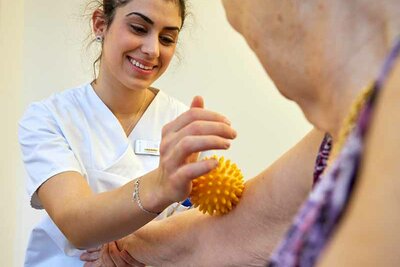Info about nursing education
Hardly any other training profession is as varied and versatile as nursing. The choice of orientation alone makes the working day very different: while acute events are in the foreground in the hospital, permanent care, counselling and guidance tasks determine the everyday work in inpatient long-term and day care as well as in outpatient services.
In January 2020, the previous training for nursing professions changed: The previously separate training courses for geriatric care, health care/nursing and health care/children's nursing were merged into a joint, generalist vocational training with the job title "nursing specialist".
You can find out more about the opportunities this has opened up and all the detailed information about nursing training here.
Vocational training in nursing lasts three years, in part-time at most five years, and is divided into a practical and a school-based part. The school-based part is completed at a state-recognised nursing school, the practical part at an outpatient or inpatient nursing facility as well as at other locations.
In the first two years of training, the trainees are trained in a generalist manner. In the third year of training, if certain requirements are met, students can choose whether to continue the generalist training or to pursue a degree in geriatric nursing or health care and paediatric nursing with the corresponding professional title.
The generalist, state-recognised qualification of "nursing specialist" qualifies graduates to work in all areas of nursing - whether acute care, children's nursing, inpatient or outpatient long-term care, or general, geriatric, child or adolescent psychiatric care. The degree is recognised throughout Europe. This does not apply to the degree in geriatric nursing or health and children's nursing.
In this example, an outpatient care service is the provider of the training. The orientation and in-depth assignments always take place in the facility with which the training contract was concluded.
Illustration/Icons by vantronye visuelle kommunikation/Hagen Schweitzer
In the state of Brandenburg, there are numerous training companies that offer generalist nursing training. The number of training facilities that register on the nursing training portal is constantly increasing, but does not claim to be complete.
.

The practical part of the nursing training is predominant with a total of 2,500 hours. The theoretical part of the training comprises 2,100 hours. During the practical training, the trainees should get to know all areas of nursing activity.
The training begins with an orientation assignment of 400 hours with the provider of the practical training. This gives the trainees and the training institution the opportunity to get to know each other and to gain initial insights into practical nursing work.
In addition, a compulsory placement of 400 hours is completed at the training institution in the first two years of training. In the third year of training, the in-depth placement of 500 hours also takes place at the provider of the practical training, but can take place in a different service area than originally agreed in the training contract. In addition, 80 hours, which are available for free distribution in the in-depth placement, are carried out in the trainee's own training company. In total, the training at the provider of the practical training shall comprise at least 1,300 hours.
Through further compulsory assignments in other areas of nursing, the broad professional field and the different nursing orientations are well acquainted. The 80 hours at free disposal, which can be completed e.g. in care counselling centres or in rehabilitation, also contribute to this.
The compulsory assignments include practical work in hospitals, inpatient long-term care and outpatient care. Trainees also get to know nursing in paediatrics and psychiatry (general, geronto-, paediatric, adolescent psychiatry). Except for the psychiatry assignment, all compulsory assignments must be completed by the end of the second third of training. The paediatric assignment, which must also be completed during this period, comprises at least 60 but no more than 120 hours until 31 December 2024. Any hours released may be used to reinforce the orientation assignment.
From the second half of the training onwards, trainees, provided they are over 18 years of age, shall be deployed on night duty under the direct supervision of nursing staff for a total of at least 80 but no more than 120 hours.

The theoretical and practical nursing training comprises 2,100 teaching hours. Teaching takes place at a state-recognised nursing school. The schools develop their own curricula on the basis of framework curricula according to which teaching takes place.
Based on typical learning situations, the trainees learn competences that are required for the independent and process-oriented care of people of all ages in acute and permanent inpatient as well as outpatient care situations. This includes preventive, curative, rehabilitative, palliative and social care measures that are carried out to maintain, promote, regain and improve the physical and psychological situation. An important aspect is also the learning of counselling the persons to be cared for and their relatives as well as the accompanying of dying persons.
Theoretical and specialised practical instruction is given in specially equipped practice rooms.
In order to be able to take up training in nursing, certain requirements must be met. These include
For more information about the recognition of qualifications visit https://www.arbeitsagentur.de/en.
Vocational nursing training is free of charge for trainees. No school fees have to be paid and trainees receive an appropriate training allowance. The training contract must contain concrete information on the payment and amount of the training allowance.
The training allowance is usually graded according to the year of training. Depending on the provider of the practical training, the amount of the training allowance may vary.
Further information on the level of remuneration in nursing training is available at FAQ, downloads, consulting.
As an alternative to vocational training, it is also possible to study to become a nursing specialist. The study programme lasts four years in Brandenburg. Students are generally entitled to BaföG. If vocational training is already available, partial recognition can be granted on application and the study period can be shortened.
Further information is available at FAQ, downloads, consulting.
Young talent wanted! Skilled workers are urgently needed on the labour market in all areas of care. Already today, more than one million employees work in care - that is more employees than in the German automotive industry. Nevertheless, there is a shortage of care professionals in the care sector. The reason: the number of older people is continuously increasing due to longer life expectancy, while the number of young people available to the training market is simultaneously decreasing. In the long run, this creates secure employment opportunities in this socially important occupational field.
Training in the field of nursing used to take place in three separate training paths in the fields of "child and nursing care", "care of the elderly" and "health and nursing care". In the generalist nursing training, the three previous nursing professions are merged with the job title "nursing specialist". For more information, see "Overview of nursing training".
The new generalist training offers graduates greater opportunities for employment and development and is automatically recognised throughout the EU. And the possibility of studying for an academic degree makes the profession more attractive.
The "provider of practical training" is the company that concludes the training contract with the trainee and is thus responsible for the practical part of the training. The "providers of practical training" include hospitals, full and partial inpatient care facilities and outpatient care services.
The "providers of practical training" are essentially responsible for ensuring all practical placements at the places of learning as well as for ensuring the entire implementation of practical training in terms of time and content. Overall, the trainee spends the majority of his/her practical training period with the "provider of practical training".
The coordination of training can also be transferred from the training nursing facility to a nursing school.
Yes, training in accordance with the Nursing Professions Act can also take place within the framework of further vocational training (so-called retraining).
Due to demographic change, nursing offers an interesting and future-proof field of employment. Further Invormations > (unfortunately only in German language)
It is permissible to complete the training also in part-time form with a maximum duration of up to five years.
The "Counselling Team for Nursing Education", an initiative of the Federal Ministry for Family Affairs, Senior Citizens, Women and Youth (BMFSFJ), advises interested persons on all nursing professions according to the Nursing Professions Act (PflBG). In the years 2015 to 2018, a total of around 53,000 people were advised by the counselling team. You can find the counselling team for Brandenburg here > (unfortunately only in German language)
The amount of payment depends on the provider of the practical training and can vary. It makes sense to inform yourself in good time and to ask precisely.
An orientation on remuneration and starting salaries can be found here > (unfortunately only in German language)
Under certain conditions, there are financial support options in addition to the training allowance during training:
Vocational training allowance
Trainees can be supported during training by vocational training allowance. This is granted if trainees cannot live with their parents during training because the training company is too far away from their parents' home. Training under the Nursing Professions Act is one of the eligible vocational training programmes.
BAFöG - Berufsbildungsförderungsgesetz (Vocational Training Promotion Act)
The decision to undergo training should not fail because the social, but especially the economic situation of the trainees and their families jeopardises their financial survival during training. The aim of BAföG is therefore to give all young people the opportunity to complete an education that matches their abilities and interests by providing financial support for living expenses. Training to become a nursing specialist is in principle eligible for BAföG funding. Training support is provided for living expenses and training (need).
Yes, this is possible at the Brandenburg University of Technology Cottbus-Senftenberg.
The study programme of at least three years leads to the degree of nursing specialist with an academic degree. The state professional degree is acquired at the same time as some final module examinations at the end of the study programme. Compared to vocational nursing training, the study programme pursues an extended educational goal and qualifies students to take on a more complex range of tasks.
Further information on the degree programmes in nursing at the BTU Cottbus-Senftenberg can be found here >
In the Brandenburg Continuing Education Information Portal you will find a wide range of training, further education and study opportunities in the care sector in Brandenburg and Berlin. This will help you find new impulses for your personal career choice and professional development or personnel development in your company.
You can find more information here > (unfortunately only in German language)
Photo: WFBB, WFBB, Gorodenkoff/Adobe Stock Icons by: vantronye / Hagen Schweitzer